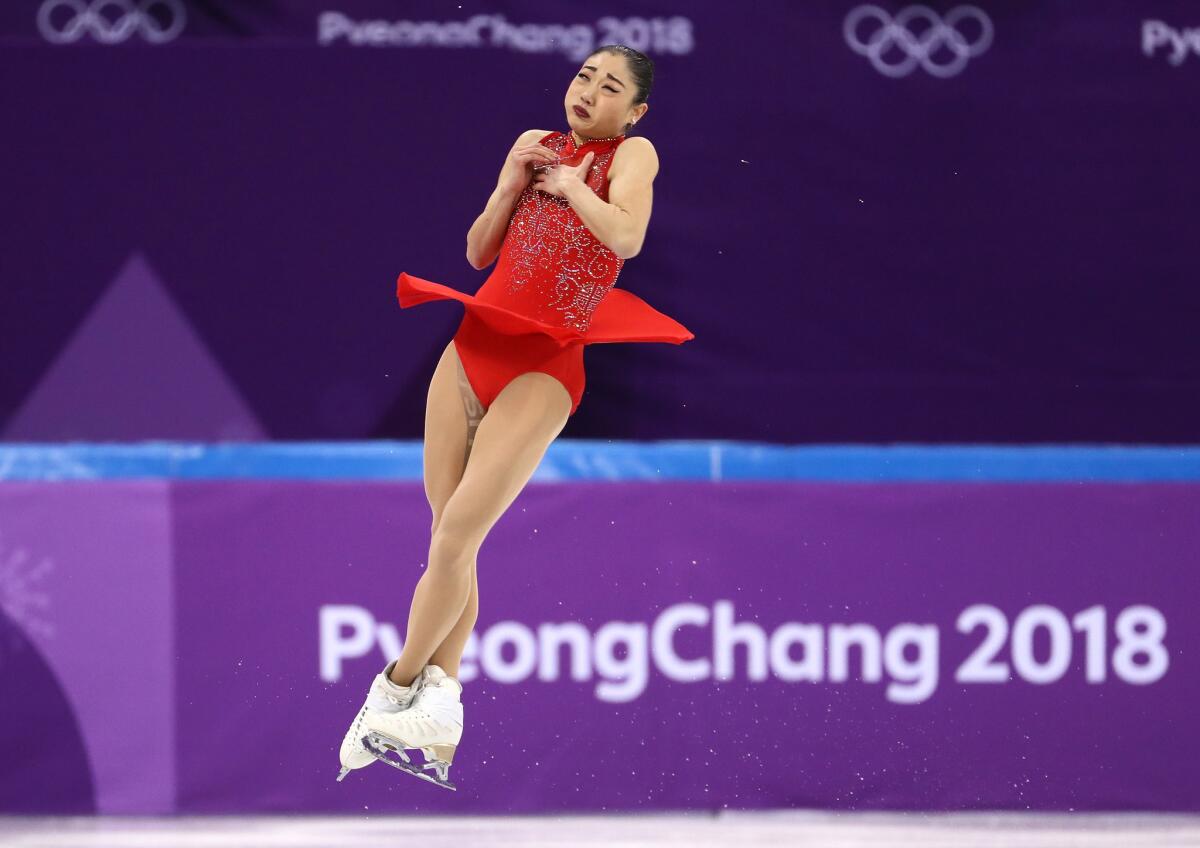Column:: Arcadia’s Mirai Nagasu is the best chance U.S. women’s figure skating has to end its medal drought

- Share via
Figure skater Mirai Nagasu proudly credits her parents for teaching her the value of hard work. They spent long hours keeping their customers well-fed and happy at the sushi restaurant they own in Arcadia, and they paid her in quarters to wash dishes and perform other chores around the place that was her second home.
Her father, Kiyoto, took his responsibilities to his employees and patrons so seriously that he refused to close up shop to watch her perform. “My dad really never had time for my skating, which was okay because they were making a living somehow and the sushi restaurant is how they made their business,” she said.
Hold the sashimi. Kiyosuzu restaurant will be closed for a few days while Kiyoto and Ikuko Nagasu watch their only child compete in the Olympic women’s singles event on Wednesday and Friday at Gangneung Ice Arena.
The 24-year-old became the talk of the figure skating world and beyond when she nailed a triple axel last week while helping the U.S. win a bronze medal in the team event, becoming the first American woman to cleanly land that 3½-rotation jump in Olympic competition. Nagasu’s feat has brought her fame, requests for dates via social media, and admiration from her peers. It might also elevate her in the judges’ eyes and boost her chances of winning a singles medal, which no American woman has managed since Sasha Cohen earned silver in 2006.
“You just never know what could happen,” Nagasu said at a news conference she shared with teammates Bradie Tennell and Karen Chen. “That’s why we’re here, and that’s why we’re competing.”
This much is clear: The favorites are 15-year-old Alina Zagitova and 2017 world champion Evgenia Medvedeva, of the Olympic Athletes from Russia team. Zagitova outscored Nagasu’s historic triple-axel performance in the team event by more than 20 points after she performed a long program that was backloaded with jumps, capitalizing on the 10 percent bonus that can be awarded for each jump done in the second half of a singles program. In the short-program phase of the team event, Medvedeva silenced doubts about the state of the foot she had broken in November by performing the highest-scored routine, earning 81.06 points.
“I feel like media has really given them this name that they’re unbeatable. It is true, but also it isn’t,” said Chen, who was the 2017 U.S. champion but yielded her title to Tennell last month. “Yes, they’re very consistent, very solid. They probably have the best shot at winning gold and getting on the podium. But again, the emphasis on the unpredictability and anything is possible. Ice is really slippery. Things happen. And there’s always a chance for other people getting on the podium.”
Zagitova’s backloading strategy has drawn criticism because it can be viewed as an unbalanced program that has little excitement for the first two minutes and a lot of jumping sequences crammed into the final minutes. Nagasu sees nothing wrong with Zagitova’s approach. “She’s just taking advantage of the current rules,” Nagasu said. Chen finds the strategy “real cool,” and added she had tried stacking her jump combinations in the second half of her program to capitalize on the bonus but didn’t feel comfortable with it. “Trying something new is kind of a risk factor and kind of something I feel I need to avoid a little bit,” Chen said.
Carolina Kostner of Italy, the Sochi bronze medalist, is another potential medalist here. So are Kaetlyn Osmond of Canada, who was the runner-up at last year’s world championships, and Gabrielle Daleman, who contributed to Canada’s gold medal in the team event. Kaori Sakamoto and Satoko Miyahara of Japan also are expected to be in the mix.
Nagasu, who finished fourth at the 2010 Vancouver Games but didn’t make the 2014 Sochi team, has the best chance of the three Americans to go home with an individual medal.
Tennell, who will skate first among the 30 competitors, reels off consistently clean jumps but lacks the mature artistry to illuminate her routines.
She will perform her short program to music from the Korean movie “Taegukgi,” and will use music from “Cinderella” for her long program. “I’ve loved Cinderella since I was 2 years old,” said Tennell, who trains near Chicago. “It’s really a dream come true.”
Chen was fourth in her debut at the world championships last year but was ill during this year’s U.S. competition and was third behind Tennell and Nagasu. She wasn’t chosen to participate in the team event and instead spent a week training on her own, far from Pyeongchang. “It’s kind of sad that I felt alone at the rink all by myself,” said Chen, whose coach, Tammy Gambill, was guiding Vincent Zhou through the men’s event but made occasional visits and watched video of Chen’s practices. “At least I was able to play my music whenever I wanted to and I was able to play my favorite playlist.”
Nagasu is sure to leave here with a medal from the team event, but she’s still hungry for an individual reward for herself and her American teammates. “Anything can happen,” she said. “I think our chances are as good as anyone else’s.”
Follow Helene Elliott on Twitter @helenenothelen
More to Read
Go beyond the scoreboard
Get the latest on L.A.'s teams in the daily Sports Report newsletter.
You may occasionally receive promotional content from the Los Angeles Times.






